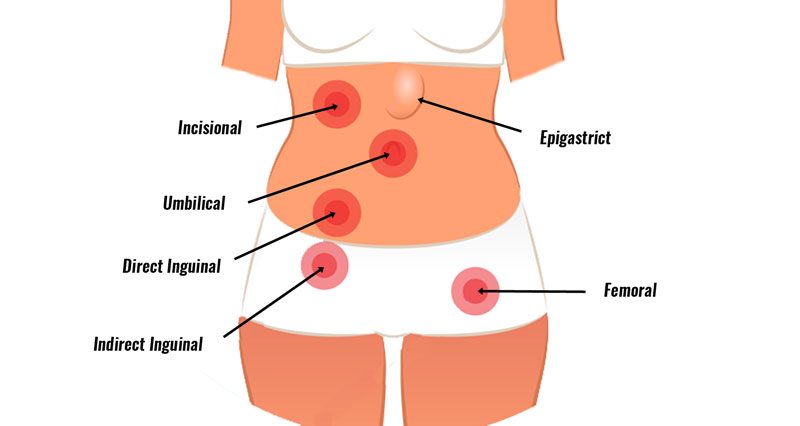Contents
Introduction
Hernias are a prevalent medical concern, affecting individuals of varying ages and backgrounds. This comprehensive guide aims to delve into the intricate world of hernias, focusing on the diverse types and advanced treatment options available at the renowned Parindhevi Hospital.
Understanding Hernias
Decoding the Basics
Hernias arise when internal organs protrude through weakened muscle walls. This fundamental understanding is pivotal to grasp the intricacies associated with hernias. Whether induced by muscle strain, congenital factors, or previous surgeries, a solid foundation in the basics is crucial for navigating the complexities of hernias.

1. Inguinal Hernia:
An inguinal hernia occurs when part of the intestine or bladder protrudes through the abdominal wall or into the inguinal canal in the groin. It is more prevalent in men, often presenting as a noticeable bulge in the groin, particularly during activities like coughing or lifting.
2. Femoral Hernia:
Femoral hernias involve a protrusion of tissue into the upper thigh, occurring just below the inguinal ligament. More common in women, femoral hernias manifest as a bulge in the groin area and may cause discomfort or pain.
3. Umbilical Hernia:
Umbilical hernias occur when part of the intestine pushes through the abdominal wall near the navel (umbilicus). Common in infants, these hernias present as a soft bulge at the belly button and often resolve on their own by age 1.
4. Hiatal Hernia:
Hiatal hernias involve the stomach protruding through the diaphragm into the chest cavity. This type can cause acid reflux and heartburn, with symptoms exacerbated by certain positions or after meals.
5. Incisional Hernia:
Incisional hernias occur at the site of a previous abdominal surgery where the muscle hasn’t fully healed. Recognized by a bulge near the surgical scar, these hernias may develop months or years after the initial surgery.
6. Epigastric Hernia:
Epigastric hernias involve fatty tissue pushing through the abdomen between the navel and breastbone. Although often painless, they may require surgical intervention if discomfort arises.
7. Spigelian Hernia:
Spigelian hernias occur along the side of the abdominal wall through a weakened area in the spigelian fascia. Recognized by a bulge along the side of the abdomen, these hernias may be challenging to diagnose due to their location.
Diving into Causes
The causes of hernias are diverse and multifaceted. Factors such as age, obesity, pregnancy, and previous surgical interventions can contribute to the weakening of muscle walls, paving the way for hernias. Exploring these causative factors sheds light on preventive strategies and targeted treatments.
Treatment Landscape
Surgical Approaches
Parindhevi Hospital stands as a beacon of expertise in hernia treatment, offering a spectrum of surgical interventions. Traditional open surgeries, characterized by larger incisions, coexist with minimally invasive laparoscopic techniques, providing patients with options tailored to their specific needs.
- Open Hernia Repair
- Laparoscopic Hernia Repair
- Robotic-Assisted Hernia Repair
- Mesh Repair
- Tension-Free Repair
- Shouldice Repair
- Plug and Patch Repair
- Desarda Technique
- Prolene Hernia System (PHS)
- Rives-Stoppa Repair
Pioneering Innovations
Embracing cutting-edge technology, Parindhevi incorporates robotic-assisted surgeries for hernia repair. This innovative approach enhances precision, reduces recovery times, and exemplifies the hospital’s commitment to staying at the forefront of medical advancements. Mesh implantation, a common practice, reinforces weakened areas, contributing to the success of hernia repairs.
Nurturing Recovery
Postoperative Care
Beyond surgical interventions, the recovery phase is paramount. Parindhevi’s postoperative care plans prioritize pain management, vigilant monitoring for potential complications, and comprehensive guidance on resuming regular activities. This holistic approach ensures patients experience optimal healing and a smooth recovery journey.
Rehabilitation Strategies
Incorporating rehabilitation strategies into the recovery process is vital. Physical therapy, tailored exercise regimens, and dietary guidance contribute to strengthening the repaired area, reducing the risk of recurrence, and fostering overall well-being.
Preventive Strategies
Lifestyle Adjustments
Empowering individuals with preventive strategies is a cornerstone of effective healthcare. Parindhevi emphasizes lifestyle adjustments, including weight management, proper lifting techniques, and avoiding prolonged straining, as pivotal in lowering the risk of hernia development.
Genetic Considerations
Recognizing the genetic component of hernias is crucial. Parindhevi Hospital integrates genetic counseling into its comprehensive approach, ensuring patients with a familial predisposition receive tailored guidance and monitoring.
Expertise at Parindhevi
Holistic Hernia Care
Parindhevi takes pride in its multidisciplinary team of specialists dedicated to delivering personalized and effective hernia care. This holistic approach ensures patients receive comprehensive attention, addressing not only the physical aspects but also considering the emotional and psychological well-being of the individual.
Cutting-Edge Diagnostics
Accurate diagnosis forms the bedrock of effective treatment. Parindhevi employs state-of-the-art diagnostic capabilities, including advanced imaging technologies and genetic testing, to precisely identify hernias’ location, severity, and any underlying genetic factors.
Patient-Centric Approach
At the heart of Parindhevi’s philosophy is a patient-centric approach. The hospital places immense importance on clear communication, involving patients in decision-making, and providing a supportive environment throughout the treatment journey.
Conclusion
In conclusion, this comprehensive guide serves as a beacon through the intricate realm of hernias. By providing insights into the diverse types and advanced treatments offered at Parindhevi Hospital, it aims to empower readers with knowledge and emphasizes the significance of seeking professional medical advice for personalized and effective hernia care.













